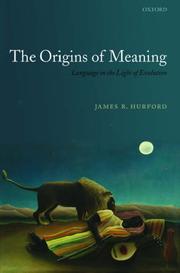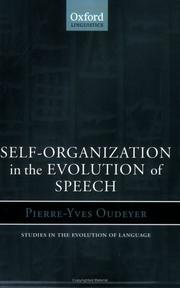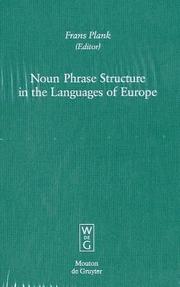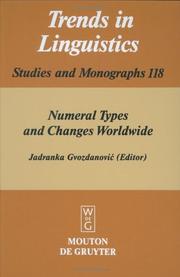| Listing 1 - 10 of 13 | << page >> |
Sort by
|

ISBN: 9780199207855 0199207852 9786611149079 0191525928 1281149071 1435609794 0191607231 9780191525926 6611149074 Year: 2007 Publisher: Oxford Oxford University Press
Abstract | Keywords | Export | Availability | Bookmark
 Loading...
Loading...Choose an application
- Reference Manager
- EndNote
- RefWorks (Direct export to RefWorks)
In this, the first of two ground-breaking volumes on the nature of language in the light of the way it evolved, James Hurford looks at the origins of meaning and of its expression in language and reviews a mass of evidence to uncover the evolutionary path between the non-speaking minds of apes and our own speaking minds. This is a landmark contribution to the understanding of linguistic and thinking processes, and the fullest account yet published of the evolution of language and. communication. - ;In this, the first of two ground-breaking volumes on the nature of language in the light of the
Communication. --- Evolution. --- Semantics --- History. --- Lexicology. Semantics --- Mass communications --- 800 --- 801.56 --- 801.56 Syntaxis. Semantiek --- Syntaxis. Semantiek --- 800 Taalwetenschap. Taalkunde. Linguistiek --- Taalwetenschap. Taalkunde. Linguistiek --- Communication --- Evolution --- Formal semantics --- Semasiology --- Semiology (Semantics) --- Comparative linguistics --- Information theory --- Language and languages --- Lexicology --- Meaning (Psychology) --- Philosophy --- Creation --- Emergence (Philosophy) --- Teleology --- Communication, Primitive --- Mass communication --- Sociology --- History
Book
ISBN: 9780199207879 Year: 2011 Publisher: Oxford Oxford University Press
Abstract | Keywords | Export | Availability | Bookmark
 Loading...
Loading...Choose an application
- Reference Manager
- EndNote
- RefWorks (Direct export to RefWorks)
This is the second of the two closely linked but self-contained volumes that comprise James Hurford's acclaimed exploration of the biological evolution of language. In the first book he looked at the evolutionary origins of meaning, ending as our distant ancestors were about to step over the brink to modern language. He now considers how that step might have been taken and the consequences it undoubtedly had. The capacity for language lets human beings formulate and express an unlimited range of propositions about real or fictitious worlds. It allows them to communicate these propositions, often overlaid with layers of nuance and irony, to other humans who can then interpret and respond to them. These processes take place at breakneck speed. Using a language means learning a vast number of arbitrary connections between forms and meanings and rules on how to manipulate them, both of which a normal human child can do in its first few years of life. James Hurford looks at how this miracle came about. The book is divided into three parts. In the first the author surveys the syntactic structures evident in the communicative behaviour of animals, such as birds and whales, and discusses how vocabularies of learned symbols could have evolved and the effects this had on human thought. In the second he considers how far the evolution of grammar depended on biological or cultural factors. In the third and final part he describes the probable route by which the human language faculty and languages evolved from simple beginnings to their present complex state.
Grammar --- Grammar, Comparative and general --- Historical linguistics --- Language and languages --- Origin of languages --- Speech --- Diachronic linguistics --- Dynamic linguistics --- Evolutionary linguistics --- Language and history --- Linguistics --- History --- Origin --- Langage --- Grammaire --- Linguistique historique --- Historical linguistics. --- Origines --- Histoire --- Origin. --- History. --- Linguistique historique. --- Origines. --- Histoire. --- Philology
Book
ISBN: 1283348454 9786613348456 019161713X 9780191617133 9780199207879 0199207879 9781283348454 6613348457 0191619930 9780191619939 Year: 2012 Publisher: Oxford New York, NY Oxford University Press
Abstract | Keywords | Export | Availability | Bookmark
 Loading...
Loading...Choose an application
- Reference Manager
- EndNote
- RefWorks (Direct export to RefWorks)
This is the second of the two closely linked but self-contained volumes that comprise James Hurford's acclaimed exploration of the biological evolution of language. In the first book he looked at the evolutionary origins of meaning, ending as our distant ancestors were about to step over the brink to modern language. He now considers how that step might have been taken and the consequences it undoubtedly had. The capacity for language lets human beings formulate and express an unlimited range of propositions about real or fictitious worlds. It allows them to communicate these propositions, oft
Language and languages --- Grammar, Comparative and general --- Historical linguistics. --- Diachronic linguistics --- Dynamic linguistics --- Evolutionary linguistics --- Language and history --- Linguistics --- Origin of languages --- Speech --- Origin. --- History. --- History --- Origin --- Philology
Book
Year: 1975 Publisher: London, New York, Melbourne Cambridge University Press
Abstract | Keywords | Export | Availability | Bookmark
 Loading...
Loading...Choose an application
- Reference Manager
- EndNote
- RefWorks (Direct export to RefWorks)

ISBN: 1281370223 9786611370220 9786610903467 0191516104 1429469838 9780191516108 9781281370228 9780191711091 0191711098 6610903468 6611370226 9781429469838 0199289158 9780199289141 019928914X 9780199289158 019928914X 9780199289141 0199289158 9780199289158 Year: 2006 Publisher: Oxford : Oxford University Press, UK,
Abstract | Keywords | Export | Availability | Bookmark
 Loading...
Loading...Choose an application
- Reference Manager
- EndNote
- RefWorks (Direct export to RefWorks)
This original and fascinating account will interest all those interested in the evolution of speech. - Folia Linguistica
Language and languages. --- Self-organizing systems. --- Speech. --- Language and languages --- Speech --- Self-organizing systems --- Languages & Literatures --- Journalism & Communications --- Philology & Linguistics --- Communication & Mass Media --- Learning systems (Automatic control) --- Self-optimizing systems --- Cybernetics --- Intellect --- Learning ability --- Synergetics --- Talking --- Oral communication --- Phonetics --- Voice --- Origin of languages --- Origin
Periodical
Abstract | Keywords | Export | Availability | Bookmark
 Loading...
Loading...Choose an application
- Reference Manager
- EndNote
- RefWorks (Direct export to RefWorks)


ISBN: 9783110197075 9783110157482 Year: 2008 Publisher: Berlin ;; Boston De Gruyter Mouton
Abstract | Keywords | Export | Availability | Bookmark
 Loading...
Loading...Choose an application
- Reference Manager
- EndNote
- RefWorks (Direct export to RefWorks)


ISBN: 9783110811193 9783110161137 Year: 2011 Publisher: Berlin ;; Boston De Gruyter Mouton
Abstract | Keywords | Export | Availability | Bookmark
 Loading...
Loading...Choose an application
- Reference Manager
- EndNote
- RefWorks (Direct export to RefWorks)
Book

ISBN: 9781474467889 Year: 2022 Publisher: Edinburgh
Abstract | Keywords | Export | Availability | Bookmark
 Loading...
Loading...Choose an application
- Reference Manager
- EndNote
- RefWorks (Direct export to RefWorks)
Book

ISBN: 9783110870374 Year: 2019 Publisher: Berlin Boston
Abstract | Keywords | Export | Availability | Bookmark
 Loading...
Loading...Choose an application
- Reference Manager
- EndNote
- RefWorks (Direct export to RefWorks)
| Listing 1 - 10 of 13 | << page >> |
Sort by
|

 Search
Search Feedback
Feedback About UniCat
About UniCat  Help
Help News
News